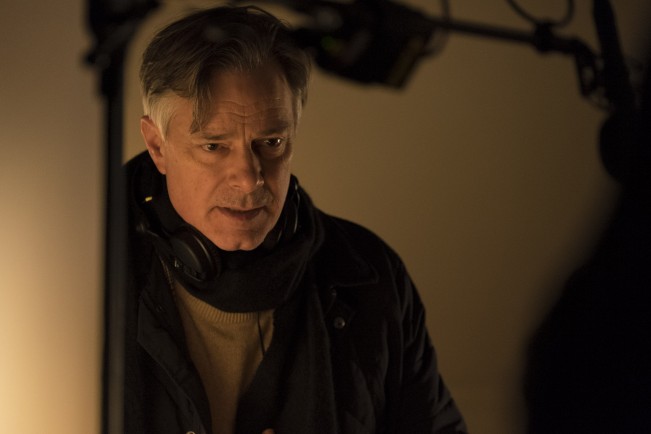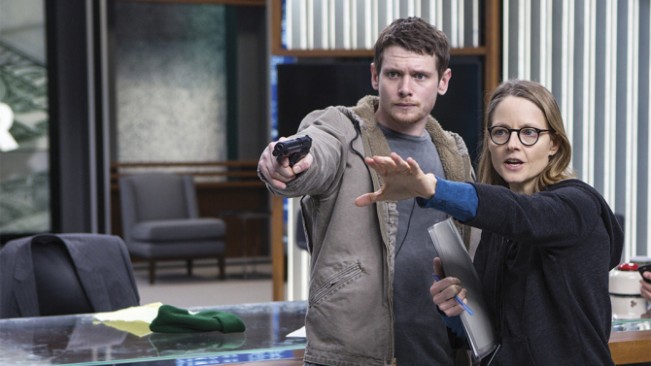

By Ray Pride Pride@moviecitynews.com
Pride, Unprejudiced: LOVE & FRIENDSHIP, MONEY MONSTER
Love & Friendship (Sony, $30 Blu; downloads)
“They have really good coffee here,” Whit Stillman tells me as he busies our introduction with small talk, recalling a previous interview and an incident involving a late colleague. (I also wondered if he remembered a slightly confounded review of Damsels in Distress.) “I’m so excited by this good coffee.”
Slightly distracted and wearing a rumpled white shirt under a sport coat and Blundstone boots, the celebrated maker of dialogue is unabashedly the “shambolic patrician” he’d been described as in a Town & Country profile I’d read on the bus over to the Michigan Avenue hotel. (In that interview, he orders club soda with lemon and returns it twice, then as his tea arrives, pockets the Earl Grey sachet: “‘Oh, I’ll keep the bag for later,’ he says, moving it to the inner pocket of his jacket.”)
My tangled suppositions were followed by half-answers and sudden silences. Soon distrust suffused the suite. I could only tell him that his Lady Susan may have begun as Jane Austen’s, and he may have transformed her into a vessel for Kate Beckinsale’s liquid lashings of the tongue, but Lady Susan is of no time, and of this time, and the most modern of characters, as in his earlier near-period pieces. There’s a Lady Susan just down the block, around that corner. Although a “calumny” is invoked, “A degree of captivating deceit” is described, as well as a “flowing spigot of malice and calumny” and the word “pride” is properly adjudicated at least thrice. And who has not wanted to announce, “I can’t support reproaches!”
In its tangled affairs of a widow, her marriage-able daughter and those who must be used to advance, Stillman etches a memorable portrait of bitter connivance brightly played, and it’s often laugh out loud. Good conversation, I observe, for an improvisational character, even when it emanates from a conniving narcissist like Lady Susan. A small chuckle escapes Stillman. The strengths include the gleaming Kate Beckinsale, chunks of plot and character motoring diffidently alongside in the characters’ walk-and-talks amidst Irish greenery, as if walking one or another Upper Sides of Manhattan. Lady Susan says many things that are on the nose, she’s self-aware and wants people to know, yes, I am devious and scheming, but this is how you fit in. “She wants her allies to know,” the sixty-four-year-old writer-director improves. “She talks honestly with Alicia. And dishonestly with everyone else.” [Read more of the interview here.]
Money Monster (Sony, $35 Blu; downlaods available)
Money Monster, a verbally snappy, ticking-clock, balls-in-the-air near-real-time hostage thriller-cum-media satire, in the hands of Jodie Foster, is compact and expansive, breezy and pitch-black. At its best, it’s a head-rush of twists and turns, behavioral asides and bitter populist exchanges. It’s also wish fulfillment for the fantasy that any banking or stock market CEOs would be punished for wrongdoing in the past decade of fiscal indecencies. (“This is just business and this is how business is done!” the bad guy insists with assurance.) George Clooney brings his Coen-style goofball game to a womanizing, telegenic airhead, Lee Gates, a less shrill version of “Mad Money”’s Jim Cramer. (The film bookends with real-life cable talking heads, slotting Wolf Blitzer as the news version of Gates, and concluding with small brisk bits from The Young Turks’ Cenk Uygur, economist-activist Robert Reich and journalist Matt Taibbi.) His showcase is a live financial vaudeville, “Money Monster,” and the plot quickly clicks into place when a weapons-bearing distraught investor (Jack O’Connell, (Starred Up, Unbroken) storms the studio to demand an explanation for how a stock Gates had picked lost $800 million-plus for its investors in a single afternoon. Julia Roberts plays the voice in Gates’ ear, his producer who struggles to direct everyone’s safety while the show stays live around the world. The rhetoric doesn’t reach for Paddy Chayefsky’s elevated song, but the dialogue bristles with disillusionment with systemic wrongs. (But Money Monster’s best scene showcases the character of a female partner (Emily Meade), playing an unexpectedly wild variation on Beatrice Straight’s Oscar-winning single scene in Chayefsky’s Network.) It’s not “Dog Day Afternoon Slot,” but as shot in widescreen by Matthew Libatique (Darren Aronofsky’s films, Inside Man), it’s propulsive entertainment. Foster lets politics and jokes fall where they may. The script, which in its character shorthand and thematic resembles 1990s high-concept screenwriting, still ticks to the eccentric, compulsive rhythms of her three earlier features (Little Man Tate, Home for the Holidays, The Beaver), is credited to Jim Kouf (Rush Hour), Jamie Linden (We Are Marshall) and Alan Fiore.
















